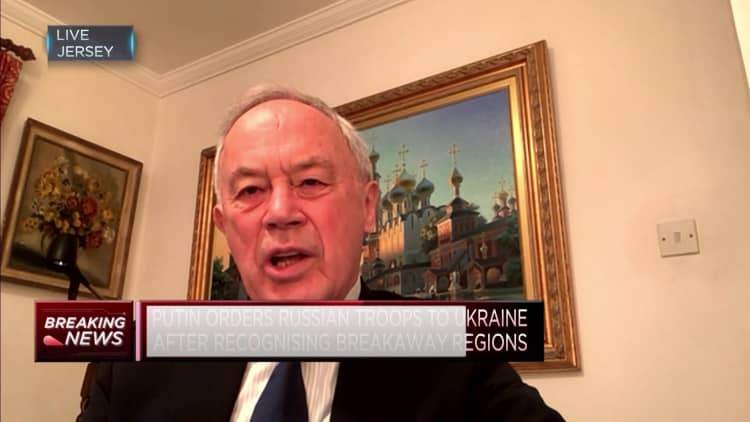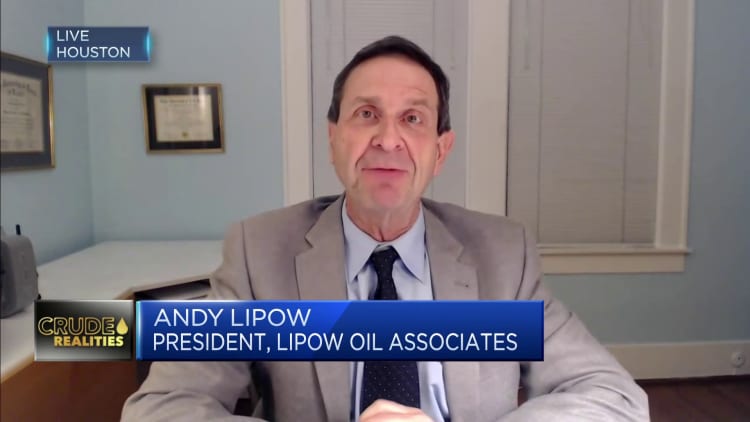The world is waiting to see what happens next in Ukraine after Russian President Vladimir Putin ordered Russian forces to move into breakaway regions of the eastern part of the country.
In the course of a dramatic few hours on Monday evening, Putin said Russia would recognize the independence of two self-proclaimed and pro-Russian republics in eastern Ukraine, and then said he would send Russian troops to the region on a "peacekeeping" mission.
Many fear that the sending of troops into the so-called Donetsk People's Republic and Luhansk People's Republic — areas in the Donbas region of eastern Ukraine that have been backed by Russia — is a precursor to a full-scale invasion of Ukraine.
It's uncertain whether troops are already on the move or not. In the two official decrees signed by Putin recognizing the breakaway republics there were no details or date given of when the deployment of Russian troops would begin, with the order saying only that it "comes into force from the day it was signed," the Moscow Times reported.
One U.K. government minister, Sajid Javid, told Sky News on Tuesday that we are "waking up to a very dark day in Europe" and said Russian tanks and troops had already been sent into eastern Ukraine, adding that "you could conclude that the invasion of Ukraine has begun."
However Putin's press spokesman, Dmitry Peskov, told reporters on Tuesday that he had no information on whether Russian forces had already entered the Donbas region or not, Reuters reported.
The West has condemned Putin's latest move on Russia's neighbor with the U.S., EU and U.K. all expected to announce new sanctions on Russia.
The U.S. was swift to announce preliminary sanctions related to the separatist regions in eastern Ukraine, banning American citizens from investment, trade or finance there. Elsewhere, EU leaders condemned Putin's announcement calling it a "blatant violation of international law" and pledging new sanctions on Russia, as did the U.K.'s Prime Minister Boris Johnson.
The Russia-Ukraine crisis has grown largely out of Ukraine's pivot toward the West in recent years and Russia's desire to keep its former Soviet territories under its influence and sway.
Russia has recently demanded that Ukraine, a country that aspires to join the EU and NATO, is never allowed to become a member of the military alliance and wanted to see NATO roll back its deployments in eastern Europe. Those demands were refused, although diplomatic talks have continued to try to avert a deepening crisis.
Putin has long-extolled the historical ties between Russia and Ukraine and did so again on Monday when he announced Moscow's recognition of the breakaway "republics," as he stated in a televised address that "modern Ukraine was entirely created by Russia."
Where will Putin stop?
Now, close watchers of Putin, are questioning what could happen next.
Andrew Wood, associate fellow at Chatham House's Russia and Eurasia program and a former British ambassador to Russia, told CNBC Tuesday that Putin's latest move shows that he is "absolutely untrustworthy."
"Nobody knows where he's going to stop but the logic is that he's going to stop when he has total control over the politics, at least, of Ukraine and that means he's installed his own regime in Ukraine to try to rule the country, to do the same thing that he's been doing to and with Belarus, to absorb both countries under his control. That's always been his aim anyway."

The dramatic escalation of the crisis this week comes after trouble has been brewing for months, and arguably, years. Russia annexed Crimea from Ukraine and 2014 and has backed pro-Russian separatists in eastern Ukraine since then, leading to lower-level fighting between Ukrainian troops and separatists which has caused around 13,000 deaths in the region.
There have been attempts by Germany and France to broker peace deals, known as the "Minsk" agreements, between Russia and Ukraine although these have largely failed with both sides accusing the other of violating the accords.
Former ambassador Wood told CNBC's "Squawk Box Europe" on Tuesday that he doesn't "see any advantage to Russia" in Putin's latest move but that the development shows that "the Minsk agreement is now written-off, so we're in a state of some anarchy."

By putting more of Russia's troops into eastern Ukraine, military pressure would now build within Ukraine rather than along its borders, Wood added.
Tensions have risen in recent months after Putin positioned upward of 100,000 troops along Russia's border with Ukraine and earlier this month conducted massive military drills with its ally Belarus, which also borders Ukraine and is under Moscow's influence.
How the West could act to contain Russia, if there is an invasion of Ukraine, remains to be seen, however.
The United Nations Security Council held a rare emergency meeting on Monday night in New York to address the latest Russian military deployment to Ukraine with U.S. Ambassador Linda Thomas-Greenfield saying Putin's announcement posed a direct threat not merely to Ukraine, but to every other sovereign member state of the United Nations.
Meanwhile, Ukraine's President Volodymyr Zelenskyy said in a televised address early Tuesday morning local time that his government won't react to provocation from Russia, but added that "we will not give anything to anyone."
"We're dedicated to diplomatic means of solving this issue. We're not reacting to any provocations," Zelenskyy said.
"This is our choice. We are on our land. We're not afraid of anyone and everyone," he said, according to a transcript by NBC News.
Read more
Global financial markets were rattled by the latest developments in the Ukraine-Russia crisis, with European stocks falling at the open.
Holger Schmieding, chief economist at Berenberg Bank, said the impact on markets over the short, medium and long-term depends on what Putin does next.
"The big uncertainty remains: Only Putin may know whether he will stop here – or whether moving Russian troops openly into Donbas is another step towards an invasion of free Ukraine," Schmieding said in a note Tuesday.
"A Russian war against Ukraine would be a human tragedy and arguably the worst global security threat since the Cuban missile crisis of 1962," Schmieding noted.
"If he stops there, sanctions would weaken the Russian economy over time with very limited impact on the advanced world," he added. Markets would return to normal after a while, he said, but added that this forecast was predicated on the basis that "Russia does not go on to attack a NATO member, which even the Soviets never did."


